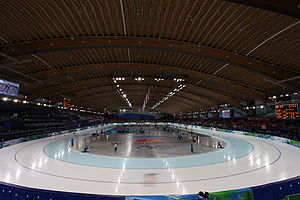Richmond Olympic Oval
 
|
|
| Full name | Richmond Olympic Oval |
|---|---|
| Location | 6111 River Road, Richmond, British Columbia, Canada |
| Coordinates | 49°10′29″N 123°9′5″W / 49.17472°N 123.15139°WCoordinates: 49°10′29″N 123°9′5″W / 49.17472°N 123.15139°W |
| Owner | City of Richmond |
| Operator | Richmond Olympic Oval Corporation |
| Capacity | 8,000 |
| Construction | |
| Broke ground | 17 November 2006 |
| Opened | 12 December 2008 |
| Construction cost | $178 million |
| Architect | CannonDesign |
| Project manager | MHPM |
| Structural engineer | Fast + Epp, Glotman Simpson |
| Tenants | |
|
2009 World Single Distance Speed Skating Championships 2010 Winter Olympics |
|
The Richmond Olympic Oval (French: Anneau olympique de Richmond) is an indoor multi-sports arena in the Canadian city of Richmond, British Columbia. The oval was built for the 2010 Winter Olympics and was originally configured with an speed skating rink. The venue has since been reconfigured and now serves as a community multi-sport park and includes two ice hockey rinks, two running tracks, a climbing wall, a rowing tank and a flexible area which can be used for, among other sports, basketball, volleyball, indoor soccer and table tennis.
The Olympic bid called for the oval to be located on the grounds of Simon Fraser University (SFU) in Burnaby, but Richmond was instead selected in 2004. Although twice the price of the SFU alternative, the location was selected because the city offered to cover all costs exceeding $60 million. Construction started in 2006, cost $178 million Cdn and the venue opened on 12 December 2008. In addition to speed skating at the 2010 Winter Olympics, the venue has hosted the 2009 World Single Distance Speed Skating Championships. Designed by CannonDesign, the oval's elements are made to resemble the heron.
Work on Vancouver's bid process started in 1998 by the Vancouver/Whistler 2010 Bid Society, replaced by the Vancouver 2010 Bid Corporation in 2002. SFU started planning their grounds as a potential speed skating oval in 2000, SFU plegded to finance $5 million of the venue, in addition to the land. The 2010 Games Operating Trust was established in November 2002 with a capital of $110 million, equally financed by the provincial and federal governments, to subsidize post-Olympic operation of selected venues. Forty percent of the payouts would be used to cover the operating costs of the speed skating oval.
...
Wikipedia
